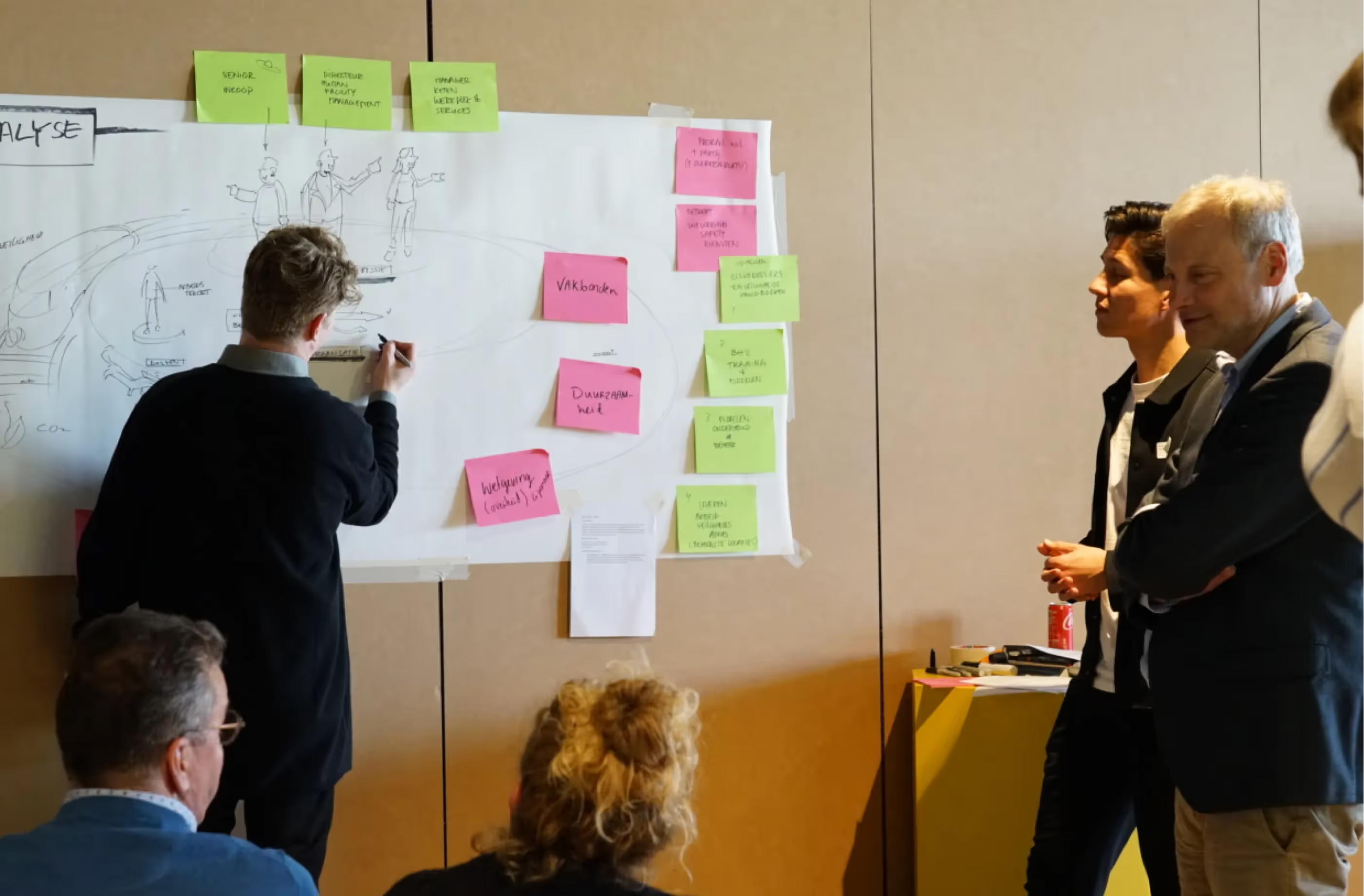What should you pay attention to when developing the right skills? This article will teach you the fundamentals for mastering the trade.
What are bids, tenders, and RFPs?
A bid, tender, or RFP is a request for quotation from a client for a specific delivery, service, or product. Providers respond to the request with their interpretation. How the bid, tender or RFP is marketed varies.
The term 'bid' is often used as a synonym for the term 'tender', but both include several types of quotation requests. And then you have the name RFP, which can vary from a Request for Proposal (RFP) - to a Request for Information (RFI), Request for Bid (RFB), Request for Quotation (RFQ), and Request for Tender (RFT).
A public tender is a request for quotation from (semi-)governments. Companies that have to tender through these procedures include, for example, the tax authorities, municipalities, but also national railroad services and public universities.
Parties that put out an RFP/RFQ/RFB/RFI are often large companies that want to purchase something. Think of large banks, software companies, or insurers. They are not obliged to put RFPs on the market through tender processes, like semi-governments. Often, questions about RFPs are simply sent to companies by email.
What do bid and tender managers do?
Appointed as the driver of the bid process, a bid, or tender manager has a clear goal: winning. As a tender manager, you do everything you can to win the order. A lot depends on that. That's why you take on multiple roles.
As a process monitor, you are responsible for planning, ensuring adherence to it, and checking if all tasks meet the required quality standards.
As a bookworm, you delve deep into the details of the tender. Your objectives are:
- Investigate whether there are risks or potential conflicts.
- Check whether you meet all the requirements of the contracting authority.
- Understanding what exactly you need to do to deliver the highest quality.
- Possibly discover how important the price is for the client.
As a mastermind, you develop the winning strategy. After all, you have to ensure that the tender is won. This is often taken up with the management team, the commercial director, or the Head of Sales. You know everything about the strengths of your company and learn everything about the deep needs, dreams and ideals of the contracting party.
As project manager, all lines go through you. You collect content for the registration from all departments and therefore also communicate with all contributors. You are often in charge of communication between departments.
As a bid guru, you build up a lot of experience in registration processes. You do this through strict evaluation, in which you keep track of the mistakes you made in the past. You maintain a high-quality content library and know exactly what works. You take this with you and implement it in future processes.
The importance of bid and tender management in the current business landscape
More and more (semi-)governments are purchasing through tenders. Suppliers must go along with this. With more contracts changing to tenders, you are more dependent on bid management. This gives reason for adjustment but also offers the following opportunities.
Tender management as a growth focus
The success of your offering depends on a new factor: bid management. But this also goes for your competition. If you invest in time, you can gain a competitive advantage with the best bid team.
You are not (only) dependent on the quality of tender managers
There are various ways to make your bid management strong, not just through bid manager training. For example, consider bid management software. This allows you to manage your registration from notification to submission and optimise it based on data.
Basics of bid and tender management
Register for tenders
Public procurement is the lifeblood of many companies, large or small. As soon as you find a tender that matches your organisation's offering, you want to register. You will then end up in a process, which we will explain in more detail below.
The importance of tenders in business
Every tender is a potential gold mine, with a reliable customer that always pays and is a great reference; the government. It is more than just a business contract; it's an opportunity to demonstrate your expertise and prove your worth. Moreover, tenders are often placed on the market for at least 4 years, so they provide a sustainable base of income.
How do you find relevant tenders?
You can find tenders through various platforms, but search functions are often limited and inconvenient. Altura has a module in their bid management software to find tenders with user-friendly search filters and functions and a daily email in which you receive your relevant tenders.
The optimal tender process
Registering for a tender is not simply filling out a form and sending it. It requires a strategic approach, thorough preparation and taking the right steps. Below we explain the optimal tender process.
8 phases of the tender process
In a slightly broader sense, you can divide the tender process into 8 phases. We will discuss this below.
1. Signalling
Be informed when a new tender comes onto the market. You can also make a forecast so that you know which tenders are coming. Critically qualify which tenders suit your organisation.
2. Preparation
Find out the ideals and needs underlying the request. Sit together with your sales team to prepare the strategy and determine the pricing.
3. Research
Conduct market research on competition and evaluate other risks in the market environment.
4. Questions
This is the Information Notice. Here you will learn everything about the tender that you have not yet learned from the client in the pre-tender. In this round, you ask questions about the tender and you can focus more on your proposition and product.
5. Proposal
Write your proposal based on your research, the best texts from previous processes and consultation with your subject matter experts and sales support.
6. Submission
You have your planning in check and know all the requirements, therefore submitting your registration is a formality. Pay close attention to where, how and when you need to upload your entry. Ensure correct signatures and formats of documents.
7. Award/negotiation
The phase of the tender process that everything revolves around. Won? You then consult with the contracting authority about the implementation. Lost? Then you now know which criteria you need to improve.
8. Evaluation
This is where you learn the most. Request a meeting with the contracting authority to determine how you won, or lost. Structure the feedback consistently and in defined streams, so you can turn it into data and improve patterns in the long term.
Tips for efficiency and effectiveness at every stage
Efficiency and effectiveness. Two magic words that can make or break any tender process. Do you want your tender process to run smoothly and successfully?
Then consider the golden guidelines of our 10 bid management best practices.
Role of technology in optimising the tender process
In our digital world, technology plays an increasingly important role in improving processes, and the tender process is no exception. Fortunately, there has been innovation in bidding process technology over the last 3 years. Because we were considerably behind our sales and marketing colleagues.
Digital collaboration tools
Do you work with a team spread across different locations? Online platforms such as Microsoft Teams or Slack are widely used but are not very efficient. Bid management software offers a better outcome because you work with everyone in one place, together with all relevant documents. Additionally, you have special tools specifically designed for bid processes.
Automated data analysis
Better understand your market and competition with advanced data analysis tools. This way you can tailor your strategy to real-time insights.
AI-driven processes
AI can help predict customer needs, automatically complete tender documents or even identify relevant tender opportunities. It's like having a digital assistant that never sleeps.
Cloud-based storage
Document management is a critical step in the tender process. Although cloud solutions, such as Google Drive or Dropbox, guarantee access to documents. They have no capabilities for AI, such as automatic writers.
In times of AI, this is something that you should consider. Simply because you need to prepare your systems to be ready for these types of AI integrations. Starting with that now can give you an edge in the long term.
Elements of a winning proposal
Software support is very valuable. Yet, even the most progressive bid managers know that successfully writing a proposal is made up of four core elements.
Comprehension
The most important thing about a tender, or RFP is that you understand the underlying motives of the customer request. You must decide for yourself which USPs and themes you base your offer on. Study the tender documents carefully and ensure that all requirements, criteria and deadlines are clear. Only then, can you be convincing with a perfect match to the customer's needs.
Strategy
To stand out you need a unique value proposition. Adjust this to the distinctive award criteria and problems that the client is experiencing. It is best to discuss this with the sales team or commercial management. Get as much information as possible about the assessment method. You base both the price and the quality that you can deliver for that price on this. Transparency in the structure of that price and optional cost savings strengthen your proposal.
Preparation
All of the above will not work without references, valid certifications and good-quality basic documentation. Therefore, during the preparation, you should ensure that you keep track of these elements of your proposal.
Project approach
Do you choose to adjust something that has been mentioned in the Information Notice? Name it. Give the customer confidence with a detailed description of the phases of the project, expected timelines, responsibilities and stakeholders.
Tips for persuasive writing
Once you have all the elements for a winning proposal in order, it is time for the next step; also convey this convincingly. Below you will find tips we learned about how to write persuasively in tenders.
Winning language vs. losing language
Use positive language instead of negative language. In this way, the reader also has a positive feeling after reading the text.
Losing language
This prevents us from going off schedule.
Winning language
This gives us absolute control over the planning.
Common mistakes and how to avoid them
We asked Octavia Siertsema, a tender specialist, what the biggest registration errors are that she encounters and how she solves them:
Mistake 1: There is a lack of priority in the organisation
Octavia's solution
Do not register if there is no absolute determination to win, or if you cannot get the team together to do so.
Mistake 2: Texts are full of marketing jargon
Octavia's solution
Invest time in your text or money in a writer. Write about your added value, not yourself.
Mistake 3: Trying in 3 weeks what takes 8 weeks
Octavia's solution
Start on time, plan realistically, and appoint a process monitor.
Presales for tenders
The importance of good preparation in the tender process

Pim de Vogel (ex-Bid Director Capgemini) explained to us in The Bidcast why you should contact the contracting authority up to 3 years before a tender could be published. He mentions the three most important reasons:
- You are a thought leader in the minds of the DMU at the contracting party.
- For orders with high personalisation, you prepare your offer well in advance to execute it perfectly.
- You will not be dependent solely on RFPs, which come down to letters, without feelings.
How to network effectively and conduct market research
The phase before the publication of the tender is called the pre-tender phase. This is your chance to influence the contracting authority for your solution. If you do not have confidence in your pre-tender, it creates uncertainty in the entire process.
Some tenders are put back on the market after a set time frame, so you know exactly when a tender will enter a new cycle.
Data-driven (pre-)tender management
Firstly, for truly effective work you should always apply data-driven bid management. This way you can capture all information about your market, customers and competition with a clear data strategy.
Close cooperation with sales
In the pre-tender phase, you set up contact moments with the contracting authority together with sales. You benefit from their expertise and insights from conversations. This way you can form a better strategy.
Market consultations: what are they and why are they so important
A market consultation is a way to obtain information about the feasibility and possible solutions for a specific project. For example, what are the latest innovations in the field of electric cars? When there is a tender coming up for deciding on new lease cars.
The conversation with the market is important for every contracting party. For a buyer it is an opportunity to gain insight into the needs and possibilities of the market.
Combining these perspectives leads to better tenders and collaborations. You inform the contracting authority about your innovations, so that they are included in the criteria.
Pre-qualification form: definition and importance
A pre-qualification form is a form that a contracting authority provides that interested tenderers must complete. This ensures that only capable parties are included. It qualifies based on the tenderer's financial situation, technical competence and experience.
For the tenderer, the form is the moment they prove they are capable of executing the contract.
Decision-making and next steps
Competing for tenders is expensive. At least, if you lose.
“Registering for a tender can easily cost you £25.800, in addition to missing out on revenue from a different tender, if you don’t prioritise well."
- Wouter van Tienhoven, CP APMP
Deciding on bid/no-bid: issues to consider
Are you going to submit a bid or not? An important question that you ask through a bid/no-bid or go/no-go moment. The purpose of that moment is to avoid wasting valuable resources, time and effort on a tender that you are unlikely to win.
To prevent this, there are many factors you need to consider:
- Are there specific requirements or qualification criteria that prevent your organisation from participating?
- Does this tender match the goals of your organisation during the contract?
- At the same time, are there no tenders where your organisation has a better chance, or where you would rather win?
- What is my perspective on this client? Do I gain more from one than the other?
Partnerships in the tender process
Some tenders are too complex, large or risky to do alone. In that case, you can choose to work with other organisations to jointly carry out a tender. This kind of partnership offers 3 advantages:
- You share the risks of carrying out the tender
- You increase your capacity
- You offer more varied knowledge and skills
Request for information (RFI)
What is an RFI and why is it important?
An RFI, or Request for Information, is a request for information about products, services or suppliers. This is often used before an RFP or tender to collect essential information.
Large companies and organisations use an RFI to inform and streamline their selection process for tenders.
Working on the RFI: 4 steps
1. Knowing what you need and from whom
Here you determine what you need to know from the customer to properly tailor your offer.
2. Concise question
When asking your question, make sure you don't miss a beat. Free interpretation = chance of answers you were not looking for.
3. Set deadline
Set a reasonable deadline for answering the questions.
4. Evaluation of the request
Finally, the request for information must be carefully evaluated before submission, there are no second chances.
How to write an effective RFI: best practices
With an effective RFI, you can give direction to the request in a suggestive way. But what should you keep in mind?
- The strengths of your product are highlighted. With innovations you can influence the expectations and therefore the final request from the contracting authority.
- Clarity in questions and communication. This ensures that all questions are answered correctly. Otherwise, you may miss out on information due to someone misunderstanding your question.
3 ways to know who the competition is in advance
- Find out which competitors tender and often win with the contracting authority. Make sure you have warm contacts, before you start pursuing your competitor’s current contracts.
- Collect competition data in your award decisions. Find where they score high and with which contracting authority this often occurs.
- Analyse which CPV codes your competitor subscribes to. Over time, see which direction they have chosen and are now choosing in their registrations.
Setting up the bid team: best practices
In your bidteam, a lot depends on involving the right people. When you put together your team, start with the following:
Subject Matter Expert
The first chef knows everything about how your product is made, delivered, or service provided. Make sure that this individual has the time available throughout the tender to support its progress.
Bid Manager
To properly comply with the rules of the tender process, you need someone who understands them well. Maintaining this is a quality in itself. This person is also the driving force when it comes to planning and adhering to the planning.
Sales Manager
There must be someone who knows what the customer finds important beyond the request. This can benefit from knowing locations, people within the contracting authority, or even the language used in your proposal.
Writing a great bid: structure and tips
Writing a successful bid requires more than just substantive expertise. It also requires a well-organised approach. Below you can read how to draw up an effective bid proposal in 5 structured steps:
1. Map crucial information
Start by listing all the important information. This includes the client's name, tender title, contract reference number, contact details and a brief description of the job.
2. Assemble your bid team
Choosing the right team is crucial. Make sure you select people with the right expertise and only involve them when their specific knowledge or feedback is required.
3. Design a tender schedule
Create a clear plan that highlights each phase of the bidding process. Also include verification steps per process, so that you can check at any time whether you are still on the right track.
4. Create a document checklist
To ensure total control of essential documents, it is advisable to make a checklist. Here you specify which document is required for submission, who is responsible for it, and what the final submission date is.
5. Feedback and control
Before the bid is submitted, it is important to have it assessed by team members or external experts. Their feedback can reveal crucial points that may have been overlooked.
By following these steps, you increase the chance of a clear, complete and convincing bid that meets all the client's requirements.
After your submission
Your bid has been submitted and the waiting period has begun. Now is when the real work begins, regardless of the outcome. From preparing for potential interviews to understanding the evaluation process, here's what to expect and how to prepare yourself.
Assessment, review and improvement processes
After every tender, there is room for growth. Use the feedback and evaluation to understand the strengths and weaknesses of your proposal. By viewing your quality scores as a development matrix, you have a roadmap for improvement.
Set up a good data strategy and read in this blog how to start with data-driven bid management in 6 steps.
Presentations, interviews and site visits: Preparation and tips
After submitting your bid, you may be invited for a presentation, interview or location visit. How do you best prepare for this?
Know your bid
Be fully familiar with what you have submitted. Questions can be deep, so make sure you know the proposal like the back of your hand.
Be professional
As with every first meeting, it is important to be on time, dress formally and have a positive and solution-oriented attitude.
Active listening
Make sure you not only answer but also actively listen to what is being asked.
Key takeaways and the future landscape of bid and tender management
The world of procurement did not see change for a long time, as there was little innovation present. Discover what AI can do for your bidding process and stay informed of trends, developments and changes in the industry. Learn from every proposal you submit and apply these lessons to future bids.
By following the steps and tips mentioned above, you can increase your chances of success in future tenders and strengthen your position in the market.
Altura bid and tender management software.
You now know what your organisation needs, what you expect from the offering and how to best organise your selection process. The next step is to weigh your options.
Although bid manager training is a worthwhile investment, software can significantly help in the bid process, where the arrival of AI is set to take control of the market.
Altura is the frontrunner in bid management software in the field of AI tools and project management. It offers data-driven bid management without the need for expertise in data analysis and brings your bid management together in one environment. Would you like to know more? Schedule a call.









.png)


.avif)




